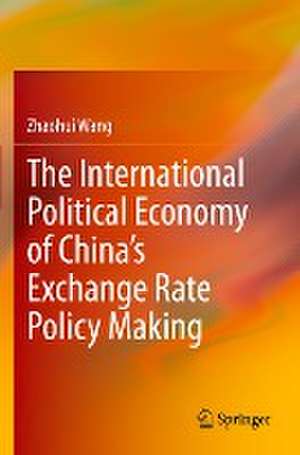The International Political Economy of China’s Exchange Rate Policy Making
Autor Zhaohui Wangen Limba Engleză Paperback – 22 ian 2022
| Toate formatele și edițiile | Preț | Express |
|---|---|---|
| Paperback (1) | 722.89 lei 6-8 săpt. | |
| Springer Nature Singapore – 22 ian 2022 | 722.89 lei 6-8 săpt. | |
| Hardback (1) | 728.91 lei 6-8 săpt. | |
| Springer Nature Singapore – 22 ian 2021 | 728.91 lei 6-8 săpt. |
Preț: 722.89 lei
Preț vechi: 881.58 lei
-18% Nou
Puncte Express: 1084
Preț estimativ în valută:
138.32€ • 150.73$ • 116.56£
138.32€ • 150.73$ • 116.56£
Carte tipărită la comandă
Livrare economică 23 aprilie-07 mai
Preluare comenzi: 021 569.72.76
Specificații
ISBN-13: 9789813345805
ISBN-10: 9813345802
Ilustrații: XII, 202 p. 34 illus., 28 illus. in color.
Dimensiuni: 155 x 235 mm
Greutate: 0.31 kg
Ediția:1st ed. 2021
Editura: Springer Nature Singapore
Colecția Springer
Locul publicării:Singapore, Singapore
ISBN-10: 9813345802
Ilustrații: XII, 202 p. 34 illus., 28 illus. in color.
Dimensiuni: 155 x 235 mm
Greutate: 0.31 kg
Ediția:1st ed. 2021
Editura: Springer Nature Singapore
Colecția Springer
Locul publicării:Singapore, Singapore
Cuprins
Chapter 1 China’s Exchange Rate Policy Making An introduction.- Chapter 2 Literature Review and Theoretical Framework.- Chapter 3 The RMB Depeg from the US Dollar, 2003-2005.- Chapter 4 The Faltering RMB Exchange Rate Reform, 2005-2007.- Chapter 5 The Back and Forth of RMB Exchange Rate Reform in Turbulent Times, 2008-2010.- Chapter 6 The Resumption of RMB Exchange Rate Reform and the Internationalization of RMB, 2010-2013.- Chapter 7 Conclusion.
Notă biografică
Zhaohui Wang is Associate Professor at the School of International Relations and the Center for Southeast Asian Studies, Xiamen University, China. He holds degrees from University of Warwick (Ph.D.), London School of Economics (M.Sc.) and Renmin University of China (Bachelor). His research lies in the fields of Politics and International Relations, Political Economy, China Studies and Southeast Asian Studies. His academic papers have appeared in Globalizations, Journal of Contemporary China, Journal of Chinese Political Science, Asian Survey among others.
Textul de pe ultima copertă
This book examines the international political economy of China’s exchange rate policy making from theoretical and empirical perspectives. It identifies the limitations in the existing Economics studies on the RMB exchange rate and the research gap of the Comparative Political Economy (CPE) and International Political Economy (IPE) approaches to exchange rate politics. The author develops a three-level game framework for China’s exchange rate policy making based on revision and synthesis of the existing CPE and IPE approaches, which provides a richer portrait of the dynamism and complexity of China’s exchange rate policy making. The book has applied the three-level game framework to empirically analyzing China’s exchange rate policy making under the Hu-Wen administration. The book also discusses some further exploration of China’s exchange rate policy in the Xi era and comparative case study of exchange rate policy making. It is a timely and rigorous study on the role that international and domestic politics play in forging China’s exchange rate policy making in the twenty-first century.
Caracteristici
Develops a three-level game framework for China’s exchange rate policy making based on revision and synthesis of the existing CPE and IPE approaches Examines empirically China’s exchange rate policy making under the Hu and Xi administrations based on documentary analysis and primary data from interviews and questionnaire surveys Provides original and systematic research on China’s exchange rate policy making under the Hu and Xi administrations to the academic literature
